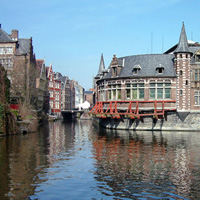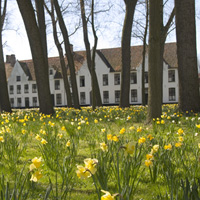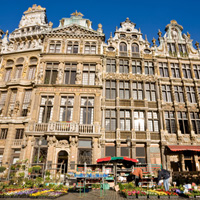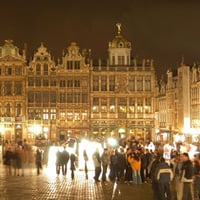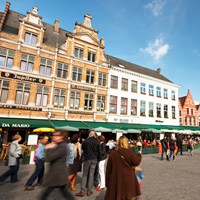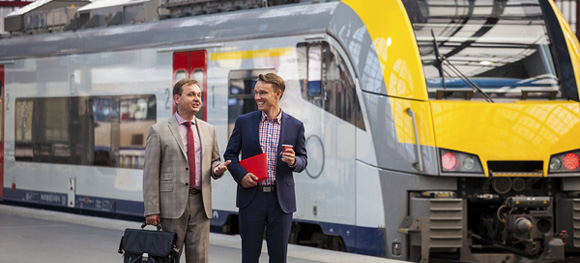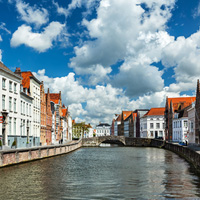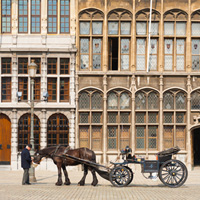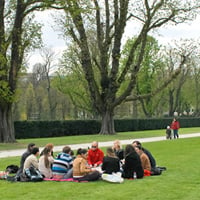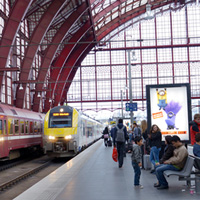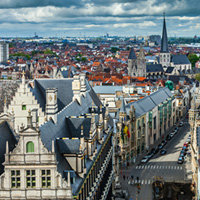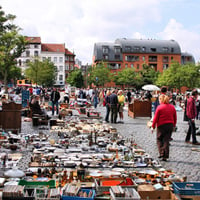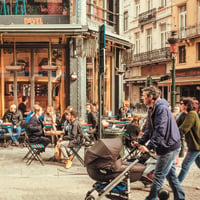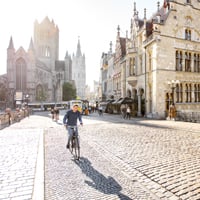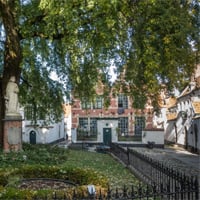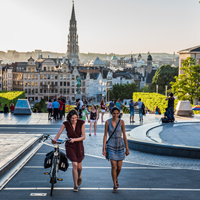Belgium
Coastal BeachesBelgium is a small, highly developed and densely populated country located in Western Europe. It is bordered by the Netherlands, Germany, Luxembourg, France, and the North Sea. Belgium has a rich history and is known for its medieval towns, Renaissance architecture, and as headquarters of the European Union and NATO. The country has three official languages: Dutch, French, and German, with distinct regions including the Dutch-speaking Flanders to the north, the French-speaking Wallonia to the south, and the bilingual Brussels-Capital Region. Belgium's landscape is varied, with the coastal plains in the northwest, the central plateau, and the Ardennes forests and hills in the southeast. It is renowned for its fine chocolates, waffles, fries, and an extensive range of beers. The country has a strong economy, a high standard of living, and an excellent healthcare system. Belgium's culture is a blend of the traditional and the modern, with a strong emphasis on the arts, music, and culinary excellence. The country's history as a battleground for European powers has left a rich tapestry of art and architecture, with numerous UNESCO World Heritage Sites. Belgium's climate is maritime temperate, with significant rainfall in all seasons and moderate temperatures. Despite its small size, Belgium plays a significant role in international politics and is a founding member of the European Union and hosts its headquarters in Brussels. It is a constitutional monarchy with a parliamentary system and has one of the world's highest rates of income equality. The Belgian economy is service-oriented and has a number of industrial and commercial sectors, including manufacturing, chemicals, pharmaceuticals, and food processing.
 AGS Worldwide Movers
AGS Worldwide MoversGet Quote
Relocating abroad soon? Make your move with AGS! AGS Worldwide Movers is a leader in the international moving industry. Our experience and expertise allows us to guarantee our clients the best quality moving services.
 AGS Worldwide Movers
AGS Worldwide MoversRelocating abroad soon? Make your move with AGS! AGS Worldwide Movers is a leader in the international moving industry. Our experience and expertise allows us to guarantee our clients the best quality moving services.
Get Quote
Living in Belgium
Best Places to Live in Belgium
Visa & Residency
Obtaining a residency in Belgium involves several steps and the process can vary depending on the type of visa one is applying for. For expats, the most common types of residency visas include the Professional Card and the Family Reunification Visa. The Professional Card is for those who want to work as self-employed individuals in Belgium. To obtain this, applicants must demonstrate that their business activities will be beneficial to the Belgian economy. The process involves submitting a detailed business plan, proof of sufficient funds to support oneself, and relevant professional experience. The Family Reunification Visa is for individuals who have family members residing in Belgium. Applicants must prove their relationship with the resident and that the resident can support them financially. The general process for obtaining a residency visa in Belgium starts with submitting an application to the Belgian consulate or embassy in one's home country. This includes completing the necessary forms, providing a valid passport, and submitting additional documents such as proof of health insurance, a certificate of good conduct, and evidence of accommodation in Belgium. After the initial approval, one may need to undergo a medical examination. Once in Belgium, the applicant must register with the local municipality, which involves providing biometric data and receiving a residence card. The difficulty of the process can be considered average, but it requires careful preparation of documents and an understanding of the specific requirements for the chosen visa category. It is advisable to start the application process well in advance of the intended move date, as processing times can vary. Additionally, proficiency in one of Belgium's official languages (Dutch, French, or German) can be beneficial during the application process and for integration into Belgian society.
Healthcare in Belgium
Belgium boasts a high-quality healthcare system that is accessible to all residents, including expats and digital nomads, once they are registered with the national social security system. The system is funded by a combination of social security contributions and health insurance funds. Public healthcare in Belgium is known for its excellent standards, with a wide network of hospitals and clinics providing comprehensive care. Private healthcare is also available and is often used for more specialized treatments or to reduce waiting times. The quality of both public and private healthcare is generally very high, with Belgium having one of the highest numbers of doctors per capita in Europe. Healthcare costs are typically shared between the patient and the social security system, with patients paying a portion of the fees as a co-payment. Expats and digital nomads can access public healthcare by registering with a local health insurance fund and obtaining a Belgian social security number, which is often tied to employment or self-employment status.
Cost of Living
The cost of living in Belgium is considered moderate compared to some of its neighboring countries. While cities like Brussels and Antwerp can be more expensive, overall, the country offers a good balance between quality of life and living expenses.
Weather
Belgium has a temperate maritime climate influenced by the North Sea and Atlantic Ocean, with cool summers and moderate winters. Rainfall is distributed throughout the year with a dryer period from April to September. The country often experiences cloudy and damp conditions.
Educational System in Belgium
Belgium's educational system is recognized for its high quality and is divided into three communities: Flemish, French, and German-speaking, each with its own regulations. Education is compulsory from the ages of 5 to 18. The system is structured into preschool, primary, and secondary education, followed by higher education. Preschool, starting at age 2.5, is not mandatory but is attended by most children. Primary education begins at age 6 and lasts for six years, focusing on basic skills and knowledge. Secondary education, starting at age 12, lasts for six years and is divided into general, technical, vocational, and art education, leading to a diploma upon completion. The school year typically starts in September and ends in June. Belgium is known for its multilingual education, with students often learning in Dutch, French, or German, depending on the region, and English as a second language. The country also offers international schools with English-language curricula, catering to expatriate families. Belgian schools emphasize critical thinking, creativity, and multilingualism, preparing students for a globalized world.
Copyright 1997-2025 Burlingame Interactive, Inc.

